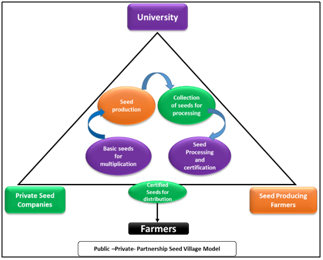Seeds of change
It is a revolutionary seed project in Malawi, bringing together the University, farmers and private sector to form a unique partnership to boost the seed system and improve income and livelihood of Malawian farmers.
In Malawi, access to quality seeds of improved cultivars of crops have been a problem for many farmers, especially smallholding ones. Even today the country’s private and public sector are not able to meet the increasing demand for high quality seeds.
USAID funded Agriculture Innovation Partnership (AIP) – Malawi project in partnership with LUANAR has adopted an innovative seed production and delivery model, similar to the successful Seed Village model of University of Agricultural Sciences- Dharwad in India. This seed village model has been adopted to include private players to play active role alongside the University and farmers. In this unique PPP model, the University develops and provides access to improved foundation seeds, extension support and mechanical seed processing using the newly established seed processing unit under this project. The farmers take the responsibility of producing high quality certified seeds following the stringent norms of seed production. The private seed enterprise take the responsibility of engaging with the farmers as well as marketing and distribution of the seeds. This initiative, once attaining its optimal scale, will be a self-sustained model not only enhancing the current seed system in Malawi, but will be the first step towards attaining self-sustenance in seed production for Malawi.
This seed village model has been adopted to include private players to play active role alongside the University and farmers. In this unique PPP model, the University develops and provides access to improved foundation seeds, extension support and mechanical seed processing using the newly established seed processing unit under this project. The farmers take the responsibility of producing high quality certified seeds following the stringent norms of seed production. The private seed enterprise take the responsibility of engaging with the farmers as well as marketing and distribution of the seeds. This initiative, once attaining its optimal scale, will be a self-sustained model not only enhancing the current seed system in Malawi, but will be the first step towards attaining self-sustenance in seed production for Malawi.
During the first year of the project, this partnership produced over 30 tons of quality-certified Beans and Cow pea seeds involving around 300 small holder farmers (including 100 women farmers), covering 90 ha of farmer fields and 10 hectares of University land. Today, Seed village Model is helping farmers increase their revenue over 2.7 times(MWK490000 per ha) in comparison to their income from traditional grain production (MWK 180000 per ha) as they moved up the value chain.
Further, the dissemination of these improved seed varieties with high germination rate will eventually help in enhancing agricultural productivity for over 1000 farmers due to increased productivity of over 1.8 times (these improved cow pea varieties have potential to achieve an yield of 900kg per ha compared to current national average yield of 508.8 Kg per ha).
AIP’s interventionhas successfully provided the necessary linkages to integrate all seed sector players including the Researchers, Extension agents, Farmers, Private sector and Policy planners. This holistic approach to seed sector development is the need of the hour in the African context and this model has great potential for expansion not only in Malawi but to other countries in the region.
Author